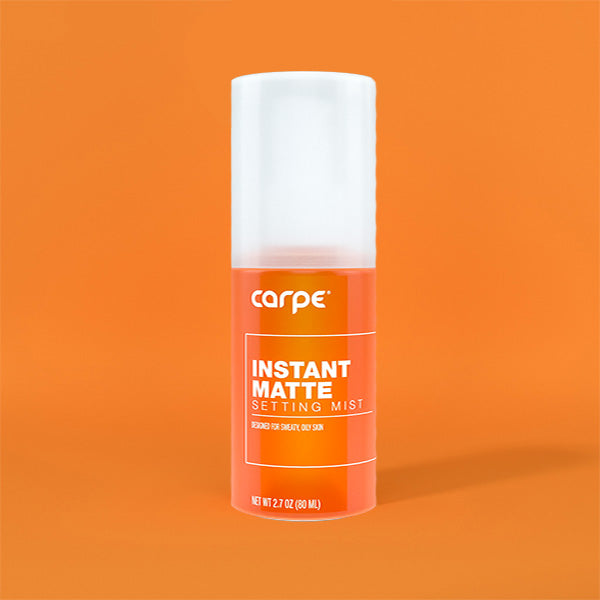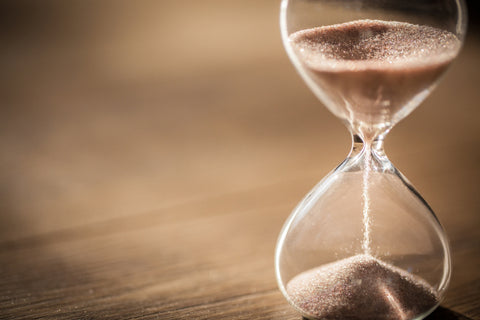WHAT IS HYPERHIDROSIS?
Hyperhidrosis, or excessive sweating, is basically when you sweat beyond comfort. People with hyperhidrosis just have overactive sweat glands.
The medical definition is sweat that is produced in excess of what is necessary for thermoregulation (the ability to maintain a healthy temperature.
Sweating is a perfectly natural and necessary function the body uses to cool itself down. We need to sweat to live, however, with hyperhidrosis, you’ll sweat even when your body isn’t overheating.[1]
SIGNS YOU MAY HAVE HYPERHIDROSIS:
- When dressing, you take into account how your clothes will be affected by sweat and whether they will show sweat stains.
- You are always aware of your environment and whether or not you can influence the temperature.
- You've hesitated to shake someone's hand.
- You tailor your routine to take in account a need for reapplying your deodorant.
- You worry about taking off you shoes in front of others.
- You leave a sweat trail.
- Noticeable sweat even when you aren't working out or overheated.
WE DON'T JUST SWEAT UNDER THE ARMS:
All can be affected:
- Feet
- Hands
- Groin
- Chest/Breasts
- Thighs
- Buttocks
- Face
- Scalp
You could have sweat in just one of these areas, or like the lucky few experience full body excessive sweating.
Hands, feet, and underarms are the parts of the body that are most likely to be affected by hyperhidrosis.[3]
People who suffer from hyperhidrosis have the same number and size of sweat glands as people who don’t have the condition. Their sweat glands are just overactive.[1]
THERE ARE SOLUTIONS:
Good news, you don't have to live with uncomfortable sweat.
SOME OPTIONS:
If you are interested in medical solutions, you can book an appointment with your dermatologist and learn how to manage hyperhidrosis with a dermatologist.[3]
THERE ARE TWO MAIN FORMS OF HYPERHIDROSIS
The vast majority of people will either have primary focal hyperhidrosis or secondary generalized hyperhidrosis.
Primary Focal Hyperhidrosis
Primary Focal Hyperhidrosis (PFH) is by far the most common type, affecting up to 90 percent of people who have hyperhidrosis.
People with primary focal hyperhidrosis only sweat in particular areas like the hands, feet, armpits, face, and groin.
Sweat will occur on both sides of the body in the same place and often in more than one area — like both hands and feet. [3]
Symptoms usually begin in childhood or adolescence and tend to last for a person’s entire lifetime. There is evidence that primary focal hyperhidrosis is hereditary, meaning it often runs in families.[3]
Secondary Generalized Hyperhidrosis
While primary focal hyperhidrosis appears to be something you’re born with, secondary generalized hyperhidrosis (SGH) is a condition that shows up during adulthood. Think of SGH as an uninvited guest who arrives on your doorstep with no warning. [3]
When someone has secondary hyperhidrosis the biggest problem isn’t the hyperhidrosis – it’s the disease or condition that might be causing it. [3]
The source of this type of hyperhidrosis can also be a medication. Many common medications can cause hyperhidrosis as a side effect.[3]
Unlike primary focal hyperhidrosis, the sweating from secondary hyperhidrosis tends to occur all over the body. This is a telltale sign of the condition.[3]
Unlike primary hyperhidrosis, this condition doesn’t have to be permanent. If the instigating condition is found and treated, it can fix the hyperhidrosis. It may take a little work.[3]
If you are concerned that your hyperhidrosis might have an underlying cause, schedule an appointment to talk to your doctor and find out.[3]
THE IMPACTS OF HYPERHIDROSIS
While hyperhidrosis isn’t particularly dangerous physically, it can be embarrassing.[3]
Unfortunately, hyperhidrosis is more serious than just uncomfortable sweating.
Up to a third of people who deal with excessive sweating from hyperhidrosis say that they are constantly bothered by their sweating.
- 75% of respondents reported that hyperhidrosis negatively impacted their social, emotional, and mental health.[4]
- Hyperhidrosis and anxiety often go hand in hand.[3]
HOW COMMON IS HYPERHIDROSIS?
- 3% of the US population struggles with hyperhidrosis. In other countries the percentage of the population that has it is even higher.[3]
Because hyperhidrosis is such an embarrassing and overlooked condition, many individuals avoid reporting the issue to their doctor. This means that the number of people who have hyperhidrosis might even be higher than we currently think.[3]
What Causes Hyperhidrosis?
Doctors don’t truly understand what causes primary focal hyperhidrosis yet. One theory is that particular nerves that control the amount of sweat overreact or malfunction. That malfunction can cause the excessive sweating that can be life-changing for those who suffer from it.[7]
Since hyperhidrosis affects so many people, researchers are now shifting into full gear to discover the causes of excessive sweating so they can develop better treatments. Future treatments and research for hyperhidrosis are being developed more rapidly than ever before.[3]
What Conditions Can Cause Secondary Generalized Hyperhidrosis?
Many diseases and medical conditions can cause hyperhidrosis. However, just because you have one of the conditions listed below this paragraph doesn’t mean you’ll develop hyperhidrosis.
Here are some of the more common conditions that may be causing the hyperhidrosis you have developed as an adult.
- A febrile illness
- Menopause
- Hyperthyroidism
- Heart failure
- Diabetes
- Frostbite
- Alcoholism - Alcohol can cause excessive sweating when someone is intoxicated, withdrawing, or in someone with an intolerance.
- Gout
- Lymphoma and some other cancers and tumors.
- Obesity
- Pregnancy
- Parkinson’s disease
- Rheumatoid arthritis
- Stroke[3]
There are also several types of common medications that cause hyperhidrosis as a side effect. So, if you are on medication and you begin experiencing new or increased amounts of sweating mention it to your doctor. Some of these medications include antidepressants, painkillers, blood pressure medications and many others.a [3]
If you think you might have secondary generalized hyperhidrosis it is very important that you speak to a doctor. Many of the things that cause it can be resolved, and it could be a sign of a more serious problem. Don’t panic, but it is wise to look into the reason you are sweating more.
What Are the Treatments for Primary Focal Hyperhidrosis?
If you are diagnosed with primary focal hyperhidrosis, there are many things you can do.These are the existing treatments for hyperhidrosis, but new treatments are currently being explored by scientists:
-
Antiperspirants:There are many over-the-counter antiperspirants that can be very useful when trying to curb sweat. If a regular antiperspirant isn’t cutting it for you, ask your doctor to write a prescription for a stronger one. You can apply antiperspirant to places other than just your underarms. Use it on your hands, hairline, or feet as well. There are even antiperspirants for the face and groin that are made specifically for sensitive areas.
-
An Iontophoresis machine:This medical device sends low-voltage currents into a pan of water where your hands or feet are sitting. The electricity can lessen the activity of your sweat glands, at least for a while. However, it can take up to 10 sessions with the iontophoresis machine to deactivate your sweat glands. You may need to use this machine up to three times a week in the beginning and one treatment can take up to 40 minutes. Although iontophoresis as a treatment for palmar and plantar hyperhidrosis may give your hands and feet a much needed break, the iontophoresis machine is anything but convenient. Iontophoresis really does work, but patients have to be willing to keep up with a regular treatment regimen for it to work successfully.
-
Botox:If other treatments aren’t enough in your, you might need Botox injections. Botox can be particularly useful for axillary hyperhidrosis, but botox can also be a treatment for palmar and plantar hyperhidrosis. Botox can provide up to 6 months of reduced sweating. If you’re going to pursue this route, you should look for someone who is experienced at doing Botox injections in the underarms to ensure the right area is targeted.
-
Anticholinergics:A few oral medications can for hyperhidrosis can reduce the amount of sweat you produce by stopping your sweat glands from working. Most commonly patients are prescribed anticholinergics like glycopyrrolate or oxybutynin as a treatment for hyperhidrosis. These medications also have several side effects, including heart palpitations, blurry vision, and dry mouth.
-
ETS Surgery:An endoscopic thoracic sympathectomy (ETS) is a surgical treatment for primary focal hyperhidrosis. It is an operation where an individual actually has the nerve endings that transfer sensory information to the sweat glands destroyed. Since no known successful reversal of an ETS surgery has ever been recorded, this option isn’t usually on the table unless the other treatments have failed. As with any surgery, it can be risky. There is also a type of surgery called an endoscopic lumbar sympathectomy which is used to treat plantar hyperhidrosis, but this surgery can be very dangerous and is almost never recommended.[3]
Defeating Hyperhidrosis
Undoubtedly, hyperhidrosis can be a hard condition to cope with. Until recently, the lack of research into hyperhidrosis had made hyperhidrosis difficult to manage. Thankfully, however, new treatments and awareness has made hyperhidrosis much easier to handle. Keep trying treatments until you find what works for you and remember that you are not alone in suffering with this condition. It’s just a matter of figuring out what you can do to control your sweat instead of your sweat controlling you!
Sources
- MedicineNet Medical Journal. (2016, May 13). Definition of Hyperhidrosis. Retrieved May 14, 2018, from https://www.medicinenet.com/script/main/art.asp?articlekey=16272
- Diaphoresis: What causes excessive sweating? (n.d.). Retrieved May 20, 2020, from https://www.medicalnewstoday.com/articles/321663#overview
- Pariser, D. M. (2014). Hyperhidrosis (4th ed., Vol. 32). Amsterdam: Elsevier Pub. Co., 2014. Retrieved from https://www.elsevier.com/books/hyperhidrosis-an-issue-of-dermatologic-clinics/pariser/978-0-323-32607-0
- Lenefsky, M., & Rice, Z. P. (2018). Hyperhidrosis and Its Impact on Those Living With It. AJMC. Retrieved from https://www.ajmc.com/journals/supplement/2018/hyperhidrosis-managed-markets-update-treatments/hyperhidrosis-and-its-impact--on-those-living-with-it
Nordqvist, C. (2017, December 21). Hyperhidrosis: Symptoms, causes, diagnosis, and treatment. Retrieved May 14, 2018, from https://www.medicalnewstoday.com/articles/182130.php
Doolittle, James, et al. “Hyperhidrosis: an Update on Prevalence and Severity in the United States.” Archives of Dermatological Research, vol. 308, no. 10, 2016, pp. 743–749., doi:10.1007/s00403-016-1697-9. Retrieved from https://pubmed.ncbi.nlm.nih.gov/27744497/
Huddle, J. R. (2014). Hyperhidrosis: Causes, Treatment Options and Outcomes. New York, NY: Nova Science. Retrieved from https://www.bookdepository.com/Hyperhidrosis-Janine-R-Huddle/9781633215160






16790753702383.jpg?v=1679075372)

16790746985853.jpg?v=1679074700)


16790757289763.jpg?v=1679075731)







